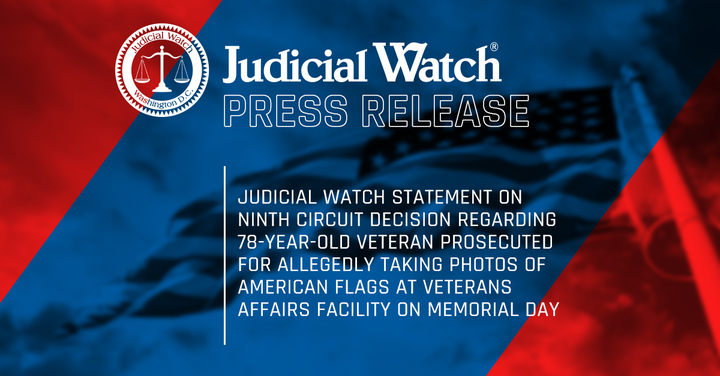

Judicial Watch Statement on Ninth Circuit Decision Regarding 78-Year-Old Veteran Prosecuted for Allegedly Taking Photos of American Flags at Veterans Affairs Facility on Memorial Day


Appeals Court overturns trial court and finds VA police officers entitled to ‘qualified immunity’
(Washington, DC) – Judicial Watch President Tom Fitton issued the following statement in response to the Ninth Circuit Court of Appeals decision granting qualified immunity to VA police officers who twice arrested Robert L. Rosebrock, a 78-year-old Vietnam era veteran who for more than a decade has been a tireless advocate for homeless veterans and powerful voice against the misuse of a 388-acre parcel of West Los Angeles real estate set aside to serve veterans:
It is a miscarriage of justice that the Ninth Circuit would allow the VA police officers who arrested Rosebrock to escape accountability for their actions. The court does not appear to have even considered the compelling arguments Judicial Watch made on Rosebrock’s behalf or the trial court’s reasoning in rejecting the officers’ qualified immunity claims.
The VA clearly holds a grudge against Rosebrock. Although a setback, the Ninth Circuit ruling is just one small skirmish in Rosebrock’s years-long struggle against veteran homelessness and demands for VA accountability. President Trump should demand answers about who at the VA and DOJ are responsible for perpetuating this grudge against a true American patriot, as well as answers about the VA’s failed policies on veteran homelessness and continued misuse of land at the West LA VA.
Qualified immunity may be appropriate in some circumstances. It clearly wasn’t in Rosebrock’s case. The Ninth Circuit clearly got it wrong.
Rosebrock was initially cited for allegedly taking unauthorized photographs of American Flags on Memorial Day 2016, at the entrance to a public park on West LA VA campus. The following Sundays, June 12 and 19, 2016, VA police officers at the West LA VA cited and arrested Rosebrock and seized his cameras for allegedly taking unauthorized photographs of the officers at the same park entrance. During the June 12 arrest, Rosebrock was handcuffed, mistreated, and forced into the back of a police vehicle.
Rosebrock was subsequently acquitted of any wrongdoing in a criminal case in which he was represented by Judicial Watch. In a cynical appeal of that ruling, the court found that the law under which Rosebrock had been charged – which expressly authorized photography for “news purposes” at “entrances” – did not prohibit anything.
In June 2017, Judicial Watch filed suit on Rosebrock’s behalf in federal court in Los Angeles, alleging that the officers violated his Fourth Amendment rights (Robert L. Rosebrock v. Michael Perez, et al. (Case No. 2:17-cv-04354) (C.D. Cal.)). The officers appealed when the trial court rejected their claims of “qualified immunity,” a controversial, court-made doctrine that often allows police officers to avoid accountability for their actions.
In their appeal, the officers argued that, even if the law under which they arrested Rosebrock did not prohibit the photography in question, they still had reason to arrest Rosebrock because, among other disingenuous claims, “protest” signs lying face down, under a jacket, constituted an “unauthorized demonstration” on VA property and that Rosebrock was “loitering” on VA property because he was at the entrance to the VA park on a Sunday afternoon, without an “official purpose,” when VA offices were closed.
###















